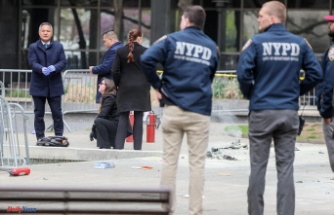After a crime, silence falls over the villa district of Kaltsee. The victim is muzzled with money, the perpetrators protest their remorse and soon the scandal seems to be forgotten. But the act makes a return to normality in the suburban idyll impossible.
Nathan and Gusten are best friends. As children of wealthy families, the two teenagers grow up in Kaltsee, a fictitious posh suburb somewhere in northern Europe. During a party at Nathan's parents' villa, they commit a terrible crime in the basement of the magnificent building. Together with two other boys, they rape Nathan's drunk ex-girlfriend Sascha, who had just broken up with him. The rape is supposed to be his revenge.
Gusten is the only one of the clique to be plagued by pangs of conscience shortly afterwards. He plans to turn himself in to the police, cracking his relationship with Nathan. He does everything he can to cover up the crime, but his childhood friend can no longer withstand the pressure and his guilty conscience. Gusten turns himself in and testifies. The case immediately became public and triggered a wave of indignation in the actually tranquil community of Kaltsee.
But as quickly as the indignation flares up in the villa district, it subsides just as quickly. The residents' desire for peace and normality is too great, and the parents of the underage perpetrators are too influential. Nathan's mother fears for her political career and does everything to protect the "boys" (as the newspapers call it) from more serious punishment, with success. The only one sentenced is Nathan - to six months probation. The other three boys are acquitted. In addition to expensive lawyers, the shocking verdict is not least due to the considerable sum of money that was used to silence Sascha and thus nip the victim's statements in the bud.
Monika Fagerholm sets this silence in her novel "Who killed Bambi?" a loud language, finds words where speaking should actually be made impossible. At a restless pace, she tells how everything gets out of hand after the rape in Kaltsee became public, how the lives of all those involved and their families are shattered in one fell swoop. The vibrations are almost noticeable when reading. Because Fagerholm doesn't allow anything to happen insidiously, but strings it together in an almost staccato-like narrative flow: "Everything that can break breaks, explodes, shatters into a thousand pieces". This rhythm invites you to read aloud, giving the text a rough sound reminiscent of punk.
And indeed, punk is not entirely unimportant for the novel, since the title of the Sex Pistols song "Who killed Bambi?" Based on that, as Monika Fagerholm reveals in September at the International Literature Festival in Berlin. "Murder, murder, murder" is what the song says, and the writer is similarly clear when she indirectly quotes the Pistols: "A rape is a rape", committed by "rapist boys". The 61-year-old reveals that this drastic approach is about fighting "systems of silence" that make those affected by sexualized violence invisible and protect the perpetrators. This is only possible by telling the stories of the victims and by uncovering and naming the workings of these silent systems of violence. Fagerholm does this, for example, when she lets Nathan's rich and influential parents, along with well-paid lawyers, fight against Sascha, who is growing up as an orphan in Kaltsee's girls' home. Protecting one's own interests and restoring a good image are more important than punishing the perpetrators fairly.
But this calculation doesn't quite add up. Because the relatives of the "Boys" can acknowledge the acquittals after the court hearing with a big grin. But the hoped-for return to the order of the day does not materialize. Nathan flees into solitude and breaks off contact with Gusten. He goes to a psychiatric clinic for therapy and will not be able to live with his guilt even after his release. The young people's friendship breaks up, and Nathan's mother's political career ends abruptly as a result of the scandal surrounding her son. "In the end, everyone is unhappy," summarizes Monika Fagerholm.
And Sasha? After the verdicts have been passed, it will be left completely to its own devices. Because unlike the perpetrators, she has no safe social network into which she can fall. In her book, the Finnish Swede describes what happened to the victim after the acquittal as the "archaic repetition of naked patriarchal power." There are the perpetrators' friends of the same age who try to turn the narrative around and portray Sascha as a "seductress". There is the self-proclaimed entrepreneur Cosmo, who uses the rape as a basis for a screenplay and capitalizes on the material. And there's the celebrity psychologist assigned to the boys by the court, who takes them on a ski trip to the Swiss Alps to "work together." While everything is done to rebuild the boys and make them forget the crime, the victim is left out. No one seems to care about Sascha anymore, or to put it in Cosmo's words: "Fuck Bambi!"
The fact that Sascha is made invisible has a system, added Antje Rávik Strubel, who said "Who killed Bambi?" translated into German. Because only if we don't see the victims "can we go on living happily," she says in an interview with Fagerholm at the International Literature Festival in Berlin. And so, in Kaltsee, an entire community is complicit by systematically remaining silent and looking the other way – and preferring to turn to the wishful thinking of their ideal world.
However, as Monika Fagerholm sums it up, "it has long since gone to pieces". Although "beaten to pieces" would be more appropriate here. Because the disintegration of families, friendships and whole lives in Kaltsee doesn't just happen, it's not a passive process. Everyone knows that Nathan, Gusten and the other boys are responsible. They know that the newspapers with their euphemistic "boys" just want to circumnavigate the word "perpetrators". And it becomes increasingly clear to the reader that eliminating punishment and deliberately ignoring the crime keeps alive a system in which rapists can always go on and their victims are abandoned.
Monika Fagerholm has set herself the goal of breaking this cycle with her latest novel, for which she was awarded the Nordic Council Literature Prize in 2020. And she lives up to her claim. "Who Killed Bambi?" looks where many prefer to look away, gets particularly loud where there is otherwise silence. And that without exploiting the torment of the victim in a voyeuristic way. The Scandinavian proves that you don't need this form of drasticity to draw attention to putting an exclamation mark. Even in the quieter moments, their language doesn't lose its power and so the wild rhythm and pull of "Who killed Bambi?" to the last page.












